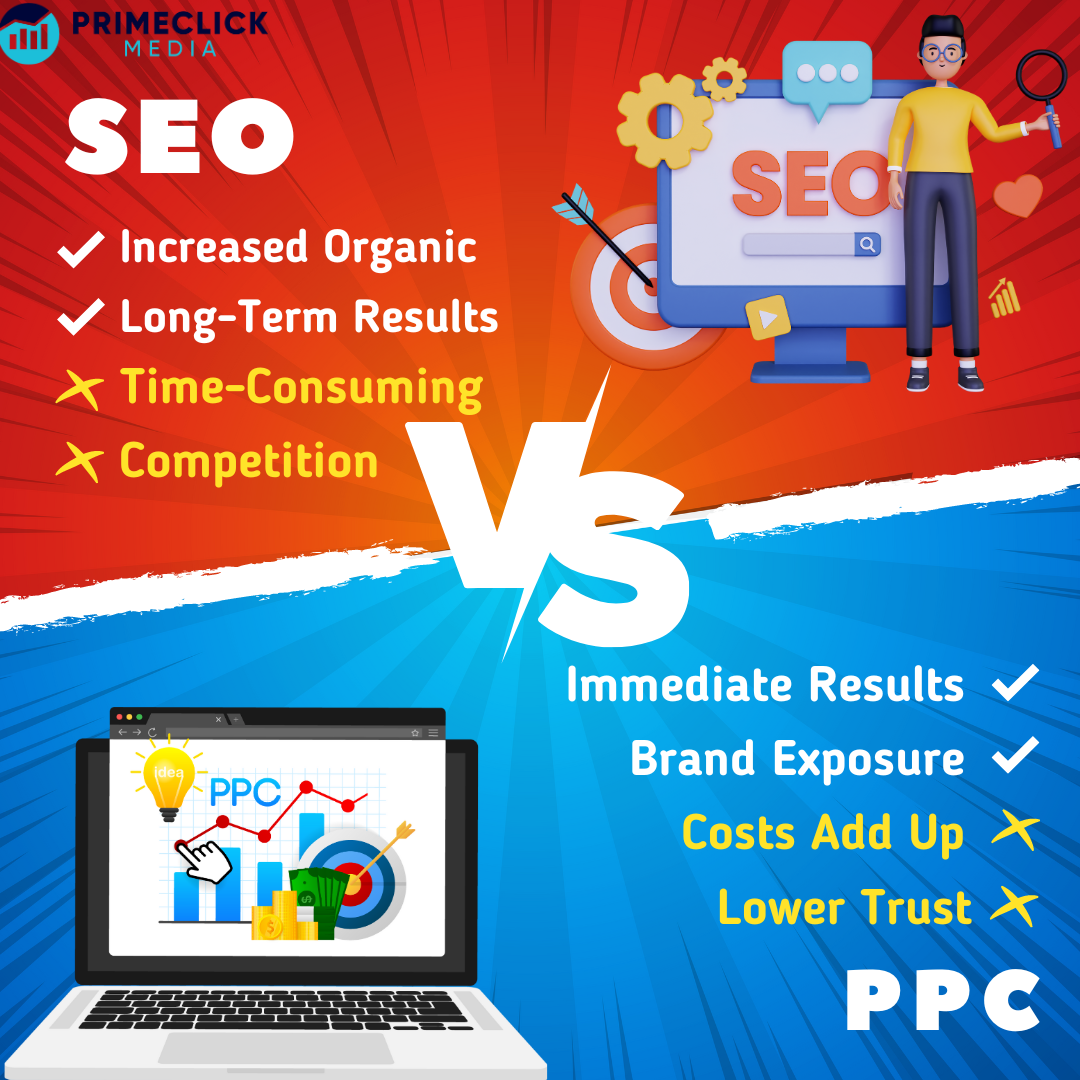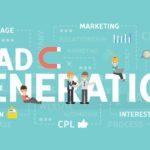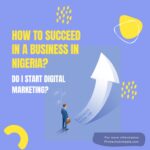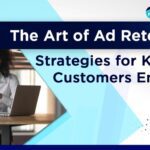In the vast realm of digital marketing, two powerful contenders vie for the spotlight: SEO (Search Engine Optimization) and PPC (Pay-Per-Click). Each promises to boost your online visibility and attract potential customers, but which is truly the better choice?
In this blog, we’ll unravel the secrets behind SEO and PPC, helping you make an informed decision on which strategy suits your business best!
What is SEO?
SEO, short for Search Engine Optimization, is a set of strategies and practices aimed at improving the visibility and ranking of a website or webpage on search engine results pages (SERPs). The goal of SEO is to increase the organic (non-paid) traffic to a website by making it more relevant and appealing to search engines and users.
In simple terms, when someone searches for a specific topic, product, or service on search engines like Google, Bing, or Yahoo, the search engine algorithms analyze and rank the most relevant web pages based on various factors. SEO is about optimizing a website to meet these factors and increase its chances of appearing higher in search results.
Key components of SEO include:
- Keywords: Identifying relevant keywords and phrases that users commonly use when searching for content related to your website. Integrating these keywords strategically into your content allows search engines to understand what your webpage is about.
- Content: Creating high-quality and valuable content that matches users’ search intent. Search engines prioritize content that is informative, engaging, and user-friendly.
- On-Page Optimization: Optimizing various elements on a webpage, such as title tags, meta descriptions, headings, and URL structures, makes it easier for search engines to crawl and understand the content.
- Backlinks: Earning high-quality backlinks from other reputable websites. Backlinks act as endorsements and can improve a webpage’s authority and credibility in the eyes of search engines.
- User Experience (UX): Ensuring that your website is easy to navigate, mobile-friendly, and loads quickly, providing a positive user experience. Search engines consider UX as a ranking factor.
- Site Architecture: Organizing your website’s structure and internal links in a logical and accessible manner for both users and search engines.
- Local SEO (for businesses): Optimizing a website to target local searches and improve visibility in local search results. This is crucial for businesses targeting a specific geographical area.
SEO is an ongoing process, as search engine algorithms frequently update to improve the relevance of search results. As a result, website owners and marketers need to stay updated with the latest SEO trends and best practices to maintain or improve their website’s rankings and visibility on search engines. When done effectively, SEO can lead to increased organic traffic, better brand visibility, and potential growth in business or website performance.
What is PPC?
PPC stands for Pay-Per-Click, which is an online advertising model used by businesses to drive traffic to their websites. In the PPC model, advertisers pay a fee each time their ad is clicked by a user. In essence, it’s a method of purchasing website visitors rather than attempting to acquire them naturally through search engine optimization (SEO).
PPC advertising can be found on various online platforms, but it is most commonly associated with search engines like Google and Bing. When users search for specific keywords or phrases related to a product, service, or topic, PPC ads related to those keywords appear at the top or bottom of the search engine results page (SERP).
Key components of PPC advertising include:
- Keyword Selection: Advertisers bid on specific keywords or phrases that are relevant to their target audience. What the advertiser is willing to spend for each click on their ad is reflected in the bid amount.
- Ad Creation: Advertisers create compelling and relevant advertisements that will appear when users search for the chosen keywords. Usually, these advertisements have a headline, a description, and a URL.
- Ad Placement: When a user enters a search query matching the selected keywords, the search engine’s algorithm determines which ads to display based on the bid amount, ad relevance, and other factors.
- Cost and Budget Control: Advertisers set a daily or monthly budget to control their spending on PPC ads. Once the budget is reached, the ads will no longer be shown until the next period.
- Performance Tracking: Advertisers use various metrics, such as click-through rate (CTR), conversion rate, and return on investment (ROI), to evaluate the effectiveness of their PPC campaigns and make necessary adjustments.
However, PPC advertising requires careful management and optimization to ensure it remains cost-effective and yields positive results. Advertisers need to continually refine their keyword selection, ad content, and bidding strategies to maximize the effectiveness of their PPC campaigns and get the most value out of their advertising budget.
Pros and Cons of SEO?
Pros of SEO:
- Increased Organic Traffic: SEO helps improve a website’s ranking in search engine results, leading to increased organic (non-paid) traffic. Higher rankings mean more visibility, making it easier for potential customers to find your website.
- Cost-Effective: SEO does not demand continuing payments for clicks or impressions, in contrast to paid advertising. Once your website achieves higher rankings, the traffic it generates is essentially free.
- Credibility and Trust: Websites that rank higher in search results are often perceived as more credible and trustworthy by users. SEO can help build a positive reputation for your brand.
- Long-Term Results: With consistent effort and updates, SEO efforts can yield long-lasting benefits. Unlike some paid advertising campaigns that end when the budget runs out, SEO maintains its impact over time.
- Better User Experience: SEO involves optimizing your website for user-friendly navigation, faster loading times, and relevant content. A positive user experience can lead to higher engagement and more conversions.
- Targeted Traffic: By optimizing for specific keywords and topics, SEO allows you to attract visitors who are actively searching for products or services related to your business, increasing the chances of conversion.
Cons of SEO:
- Time-Consuming: Achieving significant improvements in search rankings through SEO can take time, often several months or more. Patience and consistent effort are required to see tangible results.
- Constant Algorithm Changes: Search engines frequently update their algorithms to provide more accurate and relevant search results. Keeping up with these changes and adapting your SEO strategy accordingly can be challenging.
- Competition: SEO is highly competitive, especially for popular keywords and industries. It may be challenging to outrank well-established competitors with robust SEO strategies.
- No Guaranteed Results: Despite best efforts, there are no guarantees of achieving top rankings on search engines. SEO is influenced by various factors, including competition, user behaviour, and search engine algorithms.
- Technical Expertise Required: Effective SEO requires a good understanding of technical aspects, such as website structure, coding, and optimization techniques. Without the right knowledge, it can be difficult to implement successful SEO strategies.
- Constant Updates Needed: Websites and search engine algorithms are continuously evolving. To maintain or improve your rankings, you need to keep updating and optimizing your website regularly.
Pros and Cons of PPC?
Pros of PPC:
- Immediate Results: PPC campaigns can drive traffic and visibility to a website almost instantly after launching. Unlike SEO, which may take time to see significant results, PPC ads appear as soon as the campaign is active.
- Precise Targeting: PPC allows advertisers to target specific keywords, demographics, locations, devices, and even the time of day. This level of targeting ensures that your ads reach your ideal audience, maximizing the chances of conversion.
- Control over Budget: Advertisers have full control over their PPC budgets. You can set daily or monthly limits to ensure you don’t overspend on advertising.
- Measurable ROI: Since advertisers only pay for clicks (or conversions, depending on the campaign type), it is easy to measure the return on investment for each PPC campaign. This data allows for better analysis and optimization of ad performance.
- Flexibility and Customization: Advertisers can easily modify PPC campaigns in real time. You can test different ad copies, keywords, and settings to find what works best for your business.
- Brand Exposure: Even if users don’t click on your ads, PPC can increase brand visibility and awareness. People may remember your brand when they search for related products or services in the future.
Cons of PPC:
- Costs Add Up: While PPC can be cost-effective, the costs can add up, especially for competitive keywords or industries. It’s essential to monitor and optimize your campaigns to ensure they deliver a positive return on investment.
- Ad Fatigue: Users may become immune to repetitive ads, especially if they see the same ad multiple times. Advertisers need to refresh and update their ad content regularly to avoid ad fatigue.
- Immediate Visibility Only: Once your budget runs out, your ads stop appearing. Unlike SEO, which offers ongoing organic visibility, PPC visibility is limited by your advertising budget.
- Lower Trust: Some users may perceive ads as less reliable than organic search results. While PPC ads are labeled as “ads,” some users may still prefer to click on organic listings.
- Ad Blockers: Some users utilize ad blockers, which can prevent your PPC ads from reaching those users. This reduces the potential reach of your campaigns.
- Competitive Bidding: In competitive industries, bidding for top ad positions can be costly, making it challenging for smaller businesses with limited budgets to compete effectively.
Finding The Winning Strategy
The battle between SEO and PPC isn’t a matter of “which is better,” but rather “which is better for your business goals.”
Choose SEO if:
- You’re in it for the long haul, seeking steady, long-term growth.
- You have time and patience to build your online presence gradually.
- Budget constraints limit your initial ad spend.
Choose PPC if:
- You need immediate traffic and quick results for a new product or promotion.
- You have a flexible budget to invest in advertising.
- You want precise control over audience targeting and ad performance.
Conclusion
In the grand showdown of SEO versus PPC, the winner depends on your unique business objectives and resources. SEO rewards those who invest time and effort, while PPC delivers instant visibility for those willing to invest money. To maximize your digital marketing success, consider combining both strategies for a potent one-two punch!
Remember, each contender has its strengths and weaknesses, and understanding your business needs will help you make the right choice and achieve online greatness!





